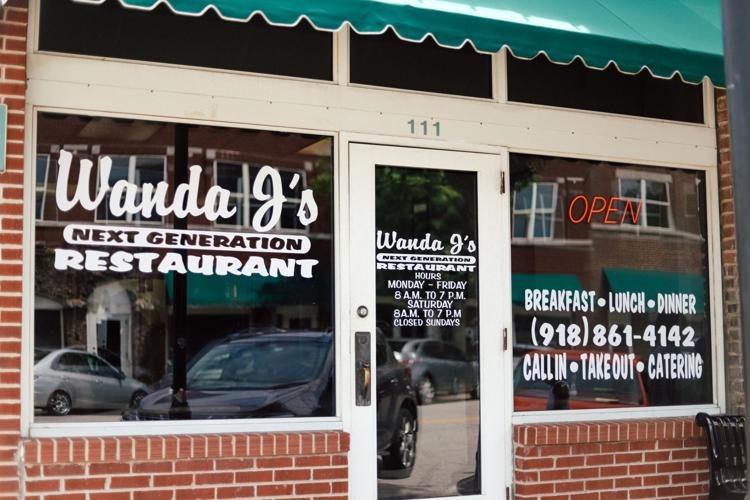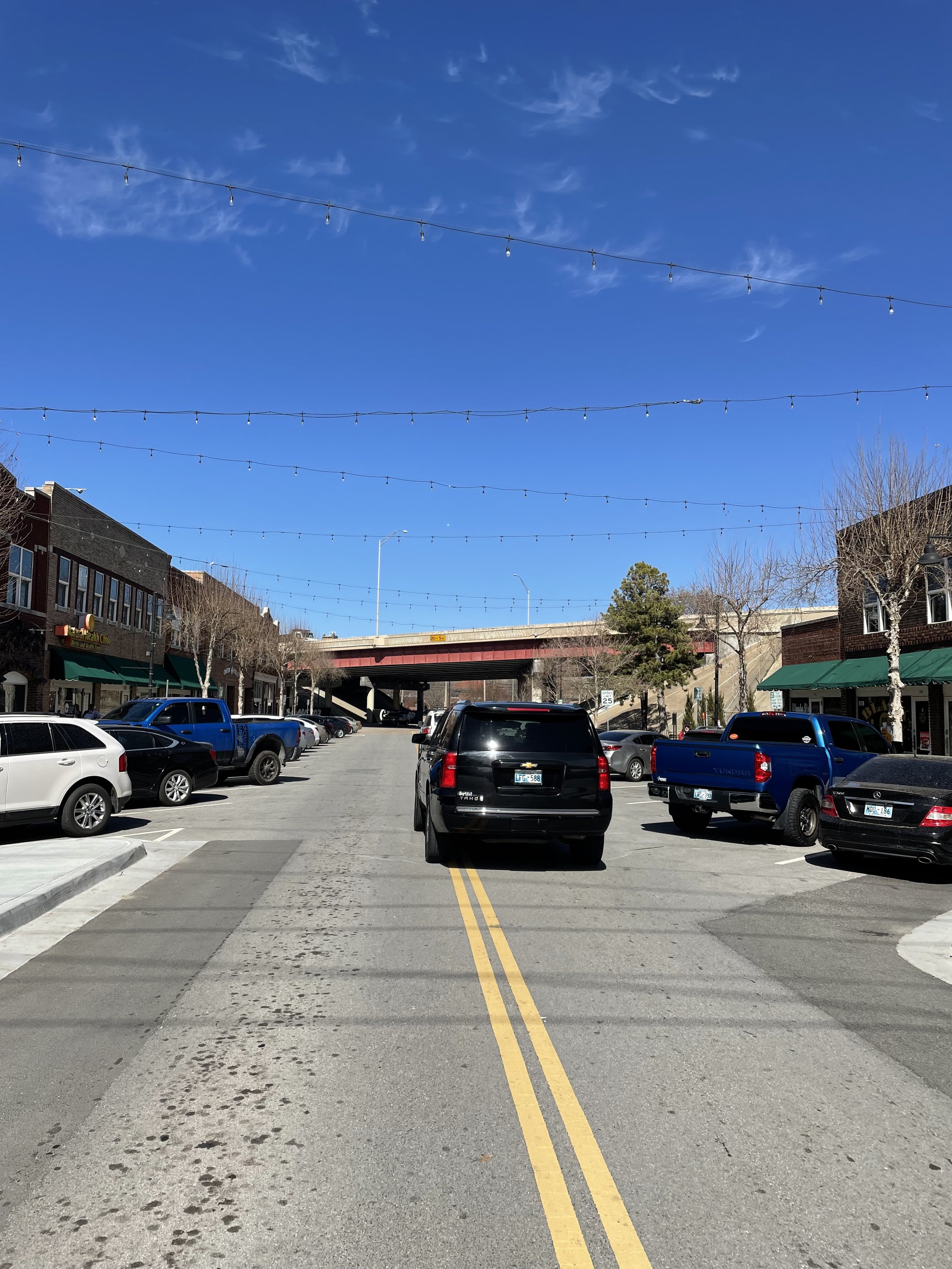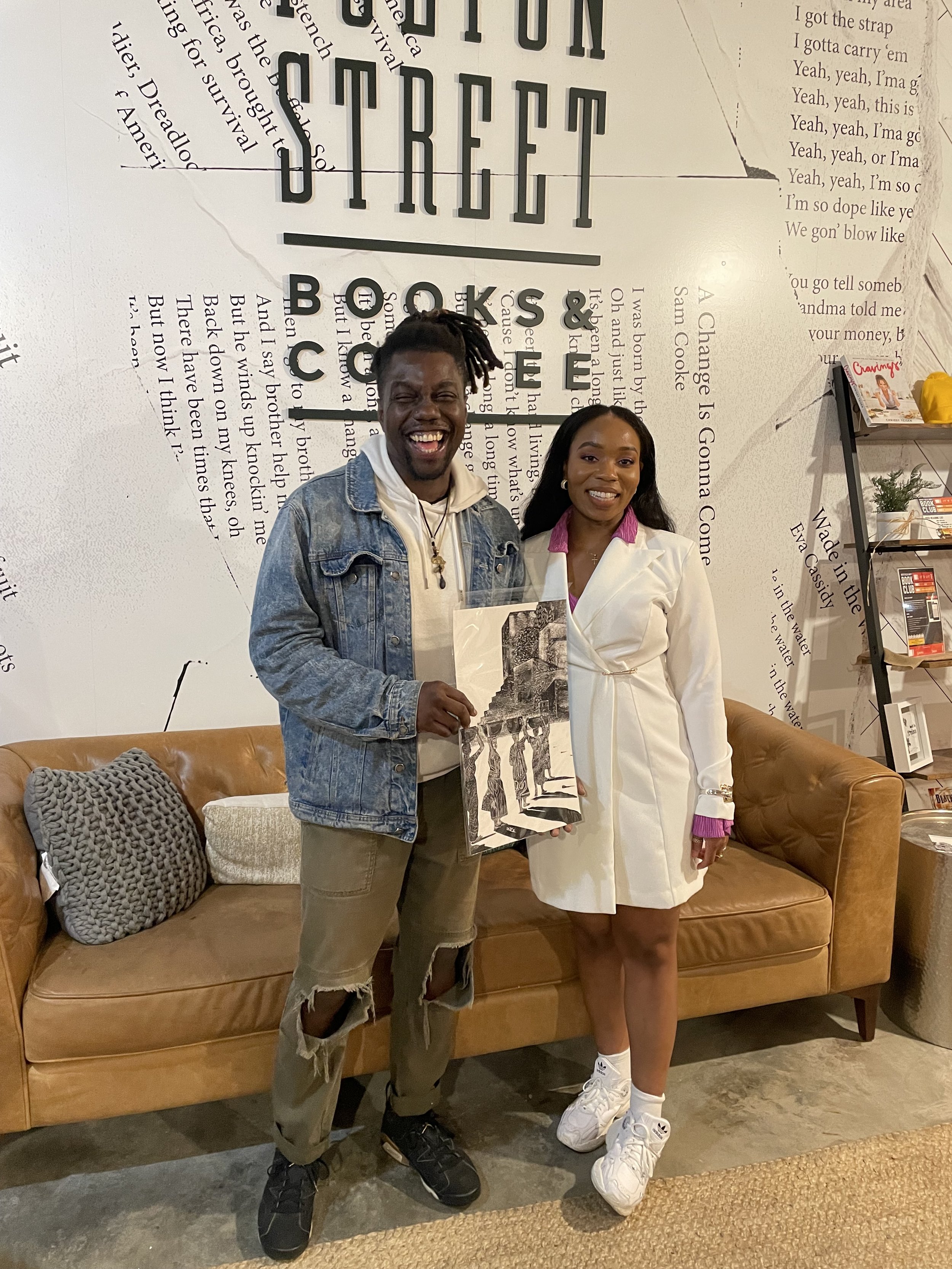The Entrepreneurial Spirit of Black Tulsa
By Leroy Adams
PHOTO: Wanda J’s Restaurant in the Greenwood District
The weight of history can be felt through the community that carries it.
Landing in South Africa, a conversation with another passenger - a white woman - underscored the legacy of apartheid and racial dynamics. She hinted that my darker skin would lead to different treatment compared to my lighter-skinned friend. This was 2018.
In China, you empathize with today's generation who bear the weight of the 1-2-2 system due to the country’s one-child-only policy. The "1-2-2 system" refers to a family structure that emerged in China as a result of the one-child policy. This policy, which was in effect from 1979 to 2015, restricted most Chinese families to having only one child. The "1-2-2" label describes the resulting demographic situation where one child is supported by two parents and four grandparents, hence the numbers: one child, two parents, and two pairs of grandparents.
In this system, the single child becomes the sole focus of investment and expectations from both parents and grandparents. This often leads to a situation where the child has six adults (two parents and four grandparents) providing care, attention, and resources, but also faces the pressure of fulfilling the expectations and needs of all these family members. This can create a unique set of social and psychological pressures on the only child since they are the sole carriers of their family's legacy and hopes.
In Ethiopia, you hear the pride in the voices of the northern people in the Tigray region when they share tales of their ancestors fighting and defeating the Italian invaders. Ethiopia is one of the few African countries that were never colonized by an outsider. The Italians tried twice only to be defeated in both instances. It will not take long for someone in Tigray to beguile you with the tales of how their ancestors outmaneuvered, outsmarted and when necessary, out-savaged the white oppressors.
In Tulsa, Oklahoma, their history is heard in the voices of the people and honored through their resilience.
PHOTO: Black Wall Street (Tulsa, Ok)
The clattering noises of my suitcase wheels rolling over the memorial plaques honoring the victims of the Tulsa Race Massacre as I walked down the sidewalk of the Greenwood district or the living survivors or the descendants sitting along that sidewalk recalling personal horror stories of that day passed down through generations shared with any willing listener. They have never forgotten.
And while many of them, including the oldest living survivor, continue to fight for reparations and the acknowledgment of what was done to their families during the Tulsa race massacre, it can be easy to characterize today's Black Tulsa generation as one that is concerned, as they should be, with only the repairing the harms committed against their ancestors. It can be easy to reduce their efforts to reclaim the wealth that was stolen by the hands of violent white people to protest and action letters. To do so would overlook what you find behind when you see beyond the initial face of exhaustion and listen to what follows when a local has shared the stories of history.
You hear stories of perseverance and resilience, and you see a generation of entrepreneurs empowered and emboldened by the entrepreneurial spirit of those they will never forget.
When I arrived in Tulsa, and my Uber drove into Greenwood, I could feel my body tighten as I recalled the history of black bodies burning and their livelihoods going up in flames. When I left Tulsa, I felt light-inspired by the black excellence legitimized by institutions like the Greenwood Center, the famous restaurant Wanda J's, and my personal favorite - Fulton Street.
A Walk Down Greenwood
A few months ago, a close friend invited me to join him on a trip. No destination was decided, only that he had a buddy pass with Southwest, and we could fly anywhere the airline did. Initially, we planned to go to Costa Rica, but we thought about our intentions for this trip. He was looking for quiet and inspiration for his writing book. I was in the early days of starting my travel magazine. A getaway to a city with a robust Black history known for its business success sounded like the perfect place for inspiration. We decided Tulsa offered us exactly what we needed. He would use the quietness of our AirBnB to focus on his book and interview entrepreneurs working to rebuild Tulsa and honor the legacy of their ancestors.
When we landed in Tulsa, we were told we had to visit Wanda J's, "a must-visit in the heart of Black Wall Street" for anyone looking for authentic soul food. We did as instructed. Our Uber dropped us off right in the center of the Greenwood District, and the first view you're presented with is a massive highway that looks out of place constructed in the center of the neighborhood. American history is filled with stories of how federal, state, and local governments effectively used highways to disrupt the economic pulse in thriving Black communities.
PHOTO: The highway constructed in the center of the Greenwood District
I stood in the center of the street for five minutes, marveling at the audacity of anyone who could deny such a blatant act of racial and economic destruction. We walked up the sidewalk looking for Wanda J's passing bookstores, barbershops, convenience stores, and their owners or patrons along the way. With our luggage in hand, we clearly stood out. Everyone was friendly and hospitable, guiding us to the restaurant and inviting us to come back to their store to learn more about the history we were walking through.
You could feel the history in your body. Again, I was overwhelmed by the bridge. A daily reminder of the forces you battle. A towering shadow of control and disruption. I needed a good meal. Something to help get the anger off my stomach. Wanda J's was the move. Wanda J's Next Generation is a family-owned business that opened in 2016. Wanda's grandchildren took what they learned from her and created Wanda J's Next Generation. Since then, Wanda's five granddaughters have been serving quality southern-style dishes and customer service that keeps folks returning. I ordered the fried chicken plate with mac n cheese and candied yams, lawd. I highly recommend it on your next visit.
The itis was now upon me; all I could think about was my bed. Wanda J's was the culinary gift that I needed after an emotional introduction to Tulsa. The restaurant would be my first experience with what I would later describe as the "Entrepreneurial Spirit of Tulsa."
PHOTO: Wanda J’s Restaurant
We Deserve This
Before arriving in Tulsa, I researched business owners or entrepreneurs I could interview on our podcast. This was customary. When preparing for Tulsa, I discovered a place.
Fulton Street is a black-owned cultural hub in the form of a bookstore. The creator and owner is Onikah Asamoa-Caesar. After about an hour inside the space, I was glad I had visited the bookstore before meeting the owner. You know that friend who is the perfect balance between well-traveled and rooted. They can tell you why Chinese people use two hands when exchanging business cards and plug into the local happenings back home. They have an eclectic group of friends as if they are at a mini United Nations conference in their living room. Their Blackness, and how they choose to express it is not up for debate, reflected by the collage of Black icons - from civil rights leaders to Dave Chapelle - along their walls. They're the friend you consider when you need someone to vent to. They're also the friend you consider when you need a nice out with a good drink and better company.
This was Fulton Street. A bookstore. A cultural experience. Black.
PHOTO: Fulton Street Bookstore
It was welcoming, warm, and nurturing. It was like a Black woman had given herself to its creation with intention. And we all know how special a home feels when a Black woman builds it.
Everyone was there, from creatives to entrepreneurs to business executives to educators and artists. You get the sense that Fulton is just that place. You can go for the vibes and tap into your creative juices as you build your business. No doubt, it is pushed by the spirit of entrepreneurship that fills this unique space.
The building was divided - the bookstore on one side and the coffee shop/bar/work space on the other. Only go with expecting to spend some coins on a new book. The walls were covered with authors I had never heard of, from George Johnson to Sherman Alexie to Yaa Gyasi. I quickly exceeded my leisure funds budget. If I find a nice, inviting bookstore. Just take all my money. Do you know what's better than finding an excellent, well-run business? Meeting employees who want and love to be there. Every employee I was greeted by or met loved working at Fulton. Everyone smiled and was excited to recommend a book. They were genuinely curious about visitors. Asking about your travels while excited to recommend their favorite local eateries.
The other side was just as nice. While there, I met entrepreneurs, business owners, artists, and students who were interested in our magazine. You could overhear conversations about planning events and organizing a speaker series, art galleries, or software for a tech project. Each shared their vision for the future of Tulsa. You get the sense that the community was invested in restoring Greenwoods to its business glory. Ideas were flowing. And bodies were moving. It was electric and contagious.
When you meet the owner, Onika, you understand why it is the place that holds the spirit of community and entrepreneurship in Tulsa. And why, if not only for inspiration and joy, must you visit when in Tulsa. Fulton Street is housed in a formerly vacant, 1,600-square-foot building and was built to be centered around literacy and community.
Onike launched a crowdfunding campaign to raise $20,000 to start the bookstore. "When we talk about this being a community space and people coming together, I also want people to feel some sense of ownership," she said.
It would take $250,000 to get the project fully funded. Much of that went towards furniture, fixtures, equipment, hiring, inventory, and working capital. According to Onika, that amount ensured they could build out the space in a way "that conveyed respect and dignity to the community." "A huge piece for me is allowing people to walk into a space and feel like "we deserve this."
With a master's degree in education from Johns Hopkins and a former teacher with Teach for America, Onika's mission includes addressing literacy and a resource deficit in her community. During our chat, Onika shared that during her research for the project, she learned that 31% of adults in Oklahoma function with basic literacy skills. Black Tulsans are three times more likely than white Tulsans to find it difficult to access resources, activities, and opportunities in Tulsa, according to the 2018 Tulsa Equality Indicator report.
When I learned that my money would benefit the bookstore and create a pathway to learning and resources for the community, I went back to buy more books. Maybe I just needed an excuse to buy more books. Either way, money well spent.
PHOTO: A gallery in Fulton Street honoring Black lives lost to police brutality.
It Exist in Tulsa
There's a palpable sense of revival and determination in this renewed era of Black Tulsa. The community is not just about reclaiming what was lost but also about redefining and expanding its identity. With everyone I met, I asked about this spirit of entrepreneurship and how it connects to Tulsa's ancestry. Khyra Chiles, an entrepreneur, sat down to chat with us about it, "The entrepreneurial spirit stayed here. Yes, after the massacre, people did leave, but people also came back. And their families came back and stayed."
Speaking to how Black Tulsans today carry that spirit on, "That spirit exists because the community refuses to let it go. Yeah, it could have died when the massacre happened, but that speaks to people of African descent. Our resilience and grit. We are never gonna stop doing, we gone do us.
"And doing us, in Tulsa, means business." When asked how the community of Tulsa supports her drive and grit, she said," I wanted my community back. I desire to be in a space with support from everywhere. Whether that's business, family, or travel. I like that support. I want that community and it exists in Tulsa.
In Tulsa, you feel that entrepreneurial drive is interwoven with cultural resilience, creating a community that is not just surviving but thriving, building spaces where Blackness, support, and unity are the pillars of every business. The vibes are contagious, inspiring a generation that looks to the future with hope, grounded in the strength of their ancestors' dreams.
PHOTO: Meeting local artists in Tulsa.
The visit to Tulsa is not just about witnessing the remnants of a tragic past; it's about experiencing the remarkable spirit of its people. As travelers, our visits can extend beyond mere tourism - they can become acts of solidarity and support for communities working tirelessly to preserve their legacy and forge a hopeful future. So, let's be more than just visitors; let's be allies in the continuous revival of places like Tulsa's Greenwood District.












